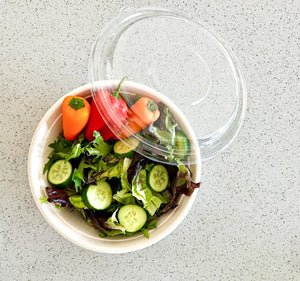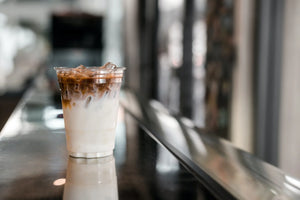Is the Biodegradable single-use coffee cup the answer?

2.5 billion coffee cups a year get thrown into the recycling bin in the UK. But almost all of it actually ends up in the landfill and less than one percent gets recycled. Will a tax on coffee cups solve the problem, like it did with the 5p charge on plastic bags? Imposing a tax on disposable coffee cups will not increase recycling rates nor stop millions of single-use cups from being littered or discarded. It is a well-ingrained delightful coffee drinking but environmentally irresponsible habit.

The single-use coffee cup has come a long way and seen many invention to promote coffee drinking convenience from the Paper cup, Plastic cup to Styrofoam cup, BUT without much regard to its impact on the waste problem.
Plastic Cup
Maybe good for an iced coffee. Definitely not for a steaming hot coffee as with no insulation qualities, you will not be able to hold the cup. Not to mention the fact that even after hundreds of years the plastic does not degrade in the landfill. Even more worrying is that plastic cups holding hot liquid can leach the dangerous bisphenol A (BPA). BPA an endocrine disruptor which mimics your body‘s natural hormones. Hormones serve different functions throughout your body. BPA has been shown to affect reproduction and brain development.
Styrofoam Cup
The perfect solution to holding a hot drink without scalding your hand! The craze started 30 years ago as a cheap and great insulation for keeping coffee hot and fingers not. And it does not leak. But this bad boy is the worst-of-the-worst when it comes to disposable coffee cups. Made from polystyrene, a type of plastic derived from petroleum, Styrofoam cups never fully degrade even after 500 years from now. Furthermore, polystyrene contains styrene that has been known to be toxic to the nervous system and disruptive to menstrual cycles.
Paper Cup
Enter the environment friendly alternative – the paper cup. But it is more expensive – five times more than the Styrofoam cup and it can still scald your fingers. To improve its functionality these cups are coated with polyethylene for insulation and durability. Hot liquid can cause the Polyethylene to leach posing health risks such as DNA damage, Alzheimer and cancer. Is there a saving grace? It degrades quickly and doesn’t harm the environment? Think about the energy used to simply create the cups – the millions of trees cut down every year just to manufacture these paper cups!
Is Recyclable Cup the answer to sustainability?
Paper cups manufacturers and users have also claimed that they are recyclable. Are they? The polyethylene coating that makes your cup sturdy also prevents it from being recycled. The success of recycling depends on the facilities capability and to large extent customers’ behaviour patterns. Even if the cup is fully recyclable, it needs to end in the right bin and not the garbage bag on the way to the landfill!
The Problem
- Firstly, most coffee cups are virtually impossible to recycle despite the three arrows recycling symbol on them. Coffee chains have been accused of making misleading claims about the sustainability of their disposable cups.
- Secondly, if the cup is indeed truly recyclable, then the problem with the recycling is both at the beginning as well as at its end. Both businesses and consumers have not paid serious notice to ensure that the recyclable coffee cup gets recycled! Whether the coffee cup you use to enjoy your morning fix on the way to work gets recycled will depend on where it lands after you have finished with it. If you toss it into a dustbin, it will most certainly land in the landfill instead of the recycling plant. And if it does land in a recycling bin, then it has to find its way to the only two specialist facilities in the UK that have the capability to strip the plastic lining off the cups and recycle the paper. The lack of effective recycling would surprise many businesses and eco-conscious consumers as most do not really question what really happens to the waste. Going from the recent debate on recycling coffee cups, there is no guarantee that even if the disposable cup bears the recycling symbol, it is actually going to be recycled!
So what can be a working sustainable alternative?
Coffee, in whichever cup has an impact on the environment. The question is how much? How do we minimise the impact and yet get to enjoy our takeaway coffee?
-
Reusable Cups
Encourage coffee lovers to bring their own reusable cups! What would then happen to the culture of coffee on the go and where do you wash your cup?
-
A transparent and sustainable solution for recyclable single use cups.
- Producers and brands should ensure that the waste industry has the ability to extract the economic value it needs to ensure a commercially viable solution. Just by using the recycling symbol does not absolves them from their responsibility. Everyone in the supply chain including the waste industry needs to collaborate and come up with workable solutions to tackle material segregation, collection and reprocessing. We do have the technology to strip the plastic lining off the cups but we need more such facilities given the humongous amount of single use cups used by coffee lovers.
- Both businesses and consumers need to see the value in turning waste into a resource. The cups need to have a clear message that it should be disposed off into a recycling bin – to remind the user not to toss it into a dustbin. For example - “Help me find my way to a recycling bin”. A system for collecting the cups and recycling them needs to be established.
-
Biodegradable disposable cups
Biodegradable disposable cups made from bioplastics which need not be recyclable but disposed off as eco-friendly waste to biodegrade under the right environment within 120 days. Hence eliminating the hassle of ensuring the cups land in a recycling bin and the right facility!
Element 100% biodegradable disposable cups:

-
meets industry certification including OK Biobased by Vincotte and ASTM D6400 and D6866;
- is made from Origo - a starch based bio-plastic made primarily from up to 70% of corn and yam and 30% - pp (polypropylene) pallets for water proofing and heat resistance qualities. When micro-organism ingests and digests the starch aspect of the product, the polypropylene (PP) content in origo that is assimilated with the corn is fully broken down into compost after 90 days even if it lands in the landfill and produces a non-toxic humus waste that can be used as fertilizers.
- is 72% more carbon efficient than traditional plastics, such polystyrene in the production process;
- is carbon neutral, non-toxic, microwaveable and freezeable, strong and durable;
- can be reused up to three times without compromising the quality.
The added bonus is that Element:
- comes in twelve vibrant and fashionable colours to suit your taste and needs
- is competitively priced to normal plastics and cheaper than most biodegradable and compostable products.






